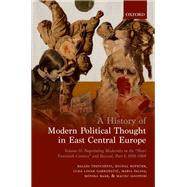A History of Modern Political Thought in East Central Europe Volume II: Negotiating Modernity in the 'Short Twentieth Century' and Beyond, Part I: 1918-1968
, by Trencsenyi, Balazs; Kopecek, Michal; Lisjak Gabrijelcic, Luka; Falina, Maria; Baar, Monika; Janowski, Maciej- ISBN: 9780198737155 | 0198737157
- Cover: Hardcover
- Copyright: 1/1/2019
A History of Modern Political Thought in East Central Europe, authored by an international team of researchers, offers the first-ever synthetic overview of the history of modern political thought in East Central Europe. Covering twenty national cultures and 250 years, it goes beyond the conventional nation-centered narratives and presents a novel vision especially sensitive to the cross-cultural entanglement of political ideas and discourses. Its principal aim is to make these cultures available for the global "market of ideas" and help rethink some of the basic assumptions about the history of modern political thought and modernity.
The second volume starts with the repercussions of the collapse of multinational empires in the region after World War I, followed by multiple cycles of democratization and authoritarian backlash. Analyzing the intellectual paradigms and debates of the Stalinist and post-Stalinist decades it shows that although the imposed Sovietization had similar blueprints, it also entailed a negotiation with local intellectual traditions. At the same time, the book identifies paradigms, such as revisionist Marxism, which were eminently transnational and crossed the Iron Curtain. The chronological starting point of Volume II/2 is the defeat of the vision of "socialism with a human face" in 1968 and the political discourses produced by the various "consolidation" or "normalization" regimes. It continues with mapping the exile communities' and dissidents' critical engagement with the local democratic and anti-democratic traditions as well as with global trends. Last but not least, rather than achieving the coveted "end of history," the liberal democratic order created in East Central Europe after 1989 became increasingly contested from left and right alike. Thus, instead of a comfortable conclusion pointing to the European integration of most of these countries, the book closes with pertinent questions about the fragility of the democratic order in this part of the world and beyond.
The second volume starts with the repercussions of the collapse of multinational empires in the region after World War I, followed by multiple cycles of democratization and authoritarian backlash. Analyzing the intellectual paradigms and debates of the Stalinist and post-Stalinist decades it shows that although the imposed Sovietization had similar blueprints, it also entailed a negotiation with local intellectual traditions. At the same time, the book identifies paradigms, such as revisionist Marxism, which were eminently transnational and crossed the Iron Curtain. The chronological starting point of Volume II/2 is the defeat of the vision of "socialism with a human face" in 1968 and the political discourses produced by the various "consolidation" or "normalization" regimes. It continues with mapping the exile communities' and dissidents' critical engagement with the local democratic and anti-democratic traditions as well as with global trends. Last but not least, rather than achieving the coveted "end of history," the liberal democratic order created in East Central Europe after 1989 became increasingly contested from left and right alike. Thus, instead of a comfortable conclusion pointing to the European integration of most of these countries, the book closes with pertinent questions about the fragility of the democratic order in this part of the world and beyond.






